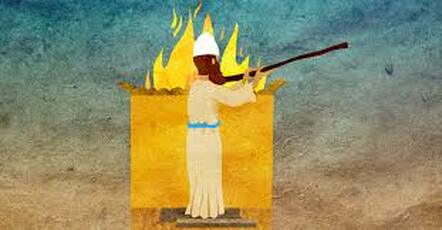
Then he is to remove those garments and put on others, before carrying the ashes outside the camp to a clean place. (Lev 6:11 CJB)
UNTIL EVENING
The parasha this week tells us that each morning, a priest is to take out from the altar the ashes of the offerings of the previous day. Rabbi Samson Raphael Hirsh comments on this passage in this way,
“The taking out of the ashes that remained on the altar from the previous day expresses the thought that with each day the Torah mission must be accomplished afresh, as if nothing had yet been accomplished.”
A Hebrew idiom for sleep is “The Small Death”. Every night we die a little. Every night we ‘die’ a little in order to ‘resurrect’ the next day to accomplish what needs to be accomplished that day with all our hearts, regardless of the effort put in the day before. In essence, we wake everyday with a sense that life is only starting; that we have this day to live for HaShem and that we should do the best of it. Rabbi Samson continues with,
The thought of what has already been accomplished, can be death to that which still needs to be accomplished.
We cannot rest on the accomplishments of the past, and we must live each day as if it were the microcosm of a whole life. It may seem a little discouraging to start over everyday, but there is a positive side to the idea.
Unless he immerses in a ritual pool, one who is ceremonially unclean is unclean until the next morning.
" 'The following will make you unclean; whoever touches the carcass of them will be unclean until evening, and whoever picks up any part of their carcass is to wash his clothes and be unclean until evening: (Lev 11:24-25 CJB)
The passage of night, the sleeping of ‘The Small Death’ also brings with it the ‘Small Resurrection’ which acts as a renewing purifier. That is why Jeremiah, the man who has seen the destruction of his beloved city of Jerusalem, the prophet who has seen the Holy City looking more like these ashes on the morning altar than the glory it previously prided of cried,
"I have been so deprived of peace, I have so forgotten what happiness is, that I think, "My strength is gone, and so is my hope in Adonai." Remember my utter misery, the wormwood and the gall. They are always on my mind; this is why I am so depressed." (Lam 3:17-20)
But then remembered,
"But in my mind I keep returning to something, something that gives me hope --that the grace of Adonai is not exhausted, that his compassion has not ended. [On the contrary,] they are new every morning! How great your faithfulness!" (Lam 3:21-23)
HaShem’s cleansing compassion is new every morning; so should our mitzvot be.
ASHES, REDEMPTION, AND MOONS
Every day the ashes of the old are removed to make place for the new. Every time the sun rises, an opportunity is born to start again. Each dawn of the morning presents us with a new chance at redemption.
Every year we tell the story. The feasts of our levitical calendar represent the times of redemption, first for Israel in the Spring then for the world in the Fall. This calendar is based on a moon that regularly dies and resurrects. These cycles give us the months which are called in Hebrew chodashim, the renewed cycles. As each month, each renewing of the moons cycle brings us closer to the remembrance of redemption.
RESURRECTION: A SECOND CHANCE
It is from that principle of death and resurrection that we learn of HaShem’s plan.
That is why the writer of the Letter to the Hebrews encourages his audience with the following words,
"For if sprinkling ceremonially unclean persons with the blood of goats and bulls and the ashes of a heifer restores their outward purity, then how much more the blood of the Messiah, who, through the eternal Spirit, offered himself to God as a sacrifice without blemish, will purify our conscience from works that lead to death, so that we can serve the living God!
It is because of this death that he is mediator of a new covenant [or will]. Because a death has occurred which sets people free from the transgressions committed under the first covenant, those who have been called may receive the promised eternal inheritance. For where there is a will, there must necessarily be produced evidence of its maker's death, since a will goes into effect only upon death; it never has force while its maker is still alive." (Heb 9:13-17)
Paul teaches the Roman congregation in the same vein when he says,
"Thus, my brothers, you have been made dead with regard to the Torah through the Messiah's body, so that you may belong to someone else, namely, the one who has been raised from the dead, in order for us to bear fruit for God." (Rom 7:4)
AS EACH MORNING, THE PRIESTS CLEANS THE ASHES OF THE ALTAR,
AS EACH DAY PRESENTS US A NEW CHANCE,
AS EACH MOON CYCLE BRINGS US CLOSER TO UNIVERSAL REDEMPTION,
AS YESHUA’S DEATH AND RESURRECTION CLEANS US FROM OUR INIQUITIES AND VESTS US IN RESURRECTION,
MAY WE ALSO EACH MORNING, FORGIVE AND PRESENT OUR FELLOW MAN WITH A NEW CHANCE AT LOVE, FRIENDSHIP, AND RENEWED RELATIONSHIP.
STAY SAFE; STAY HEALTHY; STAY HOME!
R' GAVRIEL
 RSS Feed
RSS Feed